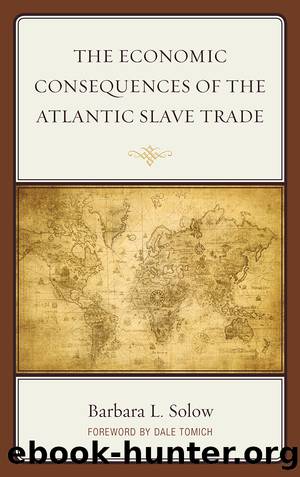The Economic Consequences of the Atlantic Slave Trade by Solow Barbara L.;Tomich Dale;

Author:Solow, Barbara L.;Tomich, Dale; [Solow, Barbara L.]
Language: eng
Format: epub
Publisher: Lexington Books
Published: 2014-08-15T00:00:00+00:00
Chapter Five
Caribbean Slavery and British Growth*
The paper supports the hypothesis advanced by Eric Williams that slavery in the British West Indies contributed significantly to English industrial growth in the second half of the eighteenth century. Objections are raised to earlier criticisms of the Williams hypothesis, and a simple Cobb-Douglas model is used to demonstrate how the slave colonies contributed to home country growth, and that this contribution was quantitatively important. The paper concludes that colonial slavery increased British national income and the pool: of investable funds and resulted in a pattern of trade that encouraged industrialization.
In his valuable survey of Caribbean historiography, Green (1977) reminds us that scholarly work for the last three decades has centered around one author and one book, Green writes: âSince the publication of Capitalism and Slavery, historical writing on the British West Indies has, to a large extent, involved a conscious confirmation or refutation of (Eric) Williamsâ several theses.1 The attack on Williamsâs work was begun by Anstey (1968). Papers by Thomas (1968) and Coelho (1973), though not specifically directed at his work, were thought to have damaged his thesis irreparably. Engerman (1972, 1975) has continued the criticism, and most recently Drescher (1977) has vigorously attacked his book.2
These criticisms have been directed at very different aspects of Williamsâs work, and there is no unanimity among the critics. For example, some argue that Capitalism and Slavery overestimates the contribution of the British West Indies to British economic development, while others argue that the colonies were a source of significant and undiminished profitability until the era of abolition. In this state of affairs, it is clear that the last word on the Williams thesis has not been spoken.
It is even possible that Williamsâs case for the importance of the connection between slavery and European expansion goes beyond his English example. The perception of this connection revolutionizes what every schoolboy thinks he knows about European expansion. A fair summary of the conventional wisdom would be illustrated by the following quotation from an eminent authority:3
âThe westward expansion of Europe after 1492, rested on the foundation of eighty years of Portuguese enterprise in the Atlantic. Portugal was the Atlantic pioneer, colonizing Atlantic islands and exploring and trading down the west coast of Africa. It was in Portugal that a body of ocean sailing and navigation was built up during the fifteenth century, and it was almost accidental that at the climax of Portuguese pioneering enterprise the most crucial of all the discoveries was made by a Genoese in the service of Spain.â
In fact the westward expansion of Europe after 1492, rested on the foundation of the expansion of Europe from the time of the First Crusade, primarily by Italians from Venice and Genoa. The economic aspect of this expansion comprised both commercial and productive activity; the productive activity was primarily though not exclusively in sugar plantations; the sugar plantations were organized with slave labor.4 There was nothing accidental in the Genoese origin of Columbus, whose father-in-law owned a sugar plantation.
Download
This site does not store any files on its server. We only index and link to content provided by other sites. Please contact the content providers to delete copyright contents if any and email us, we'll remove relevant links or contents immediately.
Cat's cradle by Kurt Vonnegut(13911)
Pimp by Iceberg Slim(12958)
Underground: A Human History of the Worlds Beneath Our Feet by Will Hunt(11279)
4 3 2 1: A Novel by Paul Auster(11087)
The Radium Girls by Kate Moore(10933)
American History Stories, Volume III (Yesterday's Classics) by Pratt Mara L(4830)
Perfect Rhythm by Jae(4634)
Wiseguy by Nicholas Pileggi(4616)
The Fire Next Time by James Baldwin(4358)
Paper Towns by Green John(4183)
A Higher Loyalty: Truth, Lies, and Leadership by James Comey(4046)
Pale Blue Dot by Carl Sagan(4027)
The Mayflower and the Pilgrims' New World by Nathaniel Philbrick(3922)
The Doomsday Machine by Daniel Ellsberg(3744)
Too Much and Not the Mood by Durga Chew-Bose(3705)
Killers of the Flower Moon: The Osage Murders and the Birth of the FBI by David Grann(3634)
The Borden Murders by Sarah Miller(3598)
The Sympathizer by Viet Thanh Nguyen(3532)
Killing England by Bill O'Reilly(3470)
